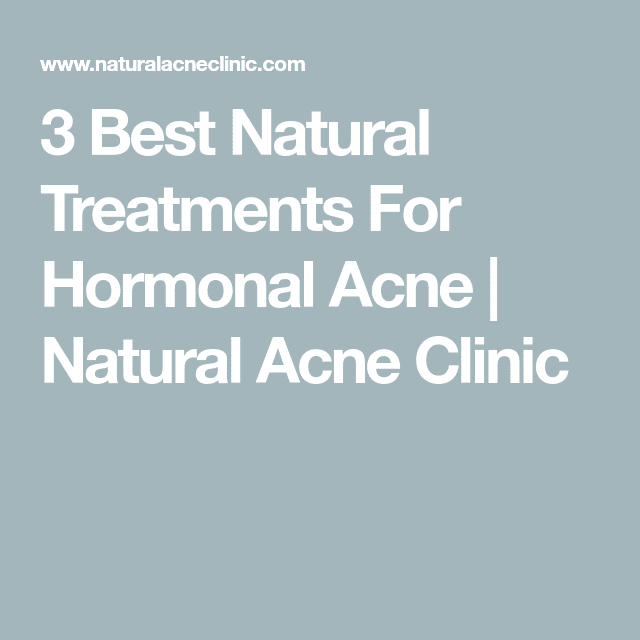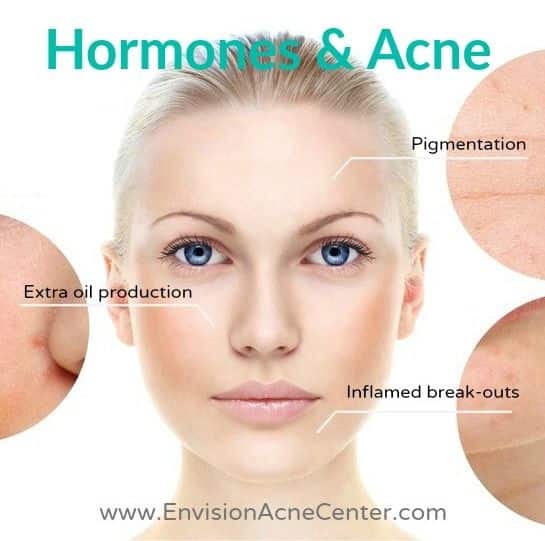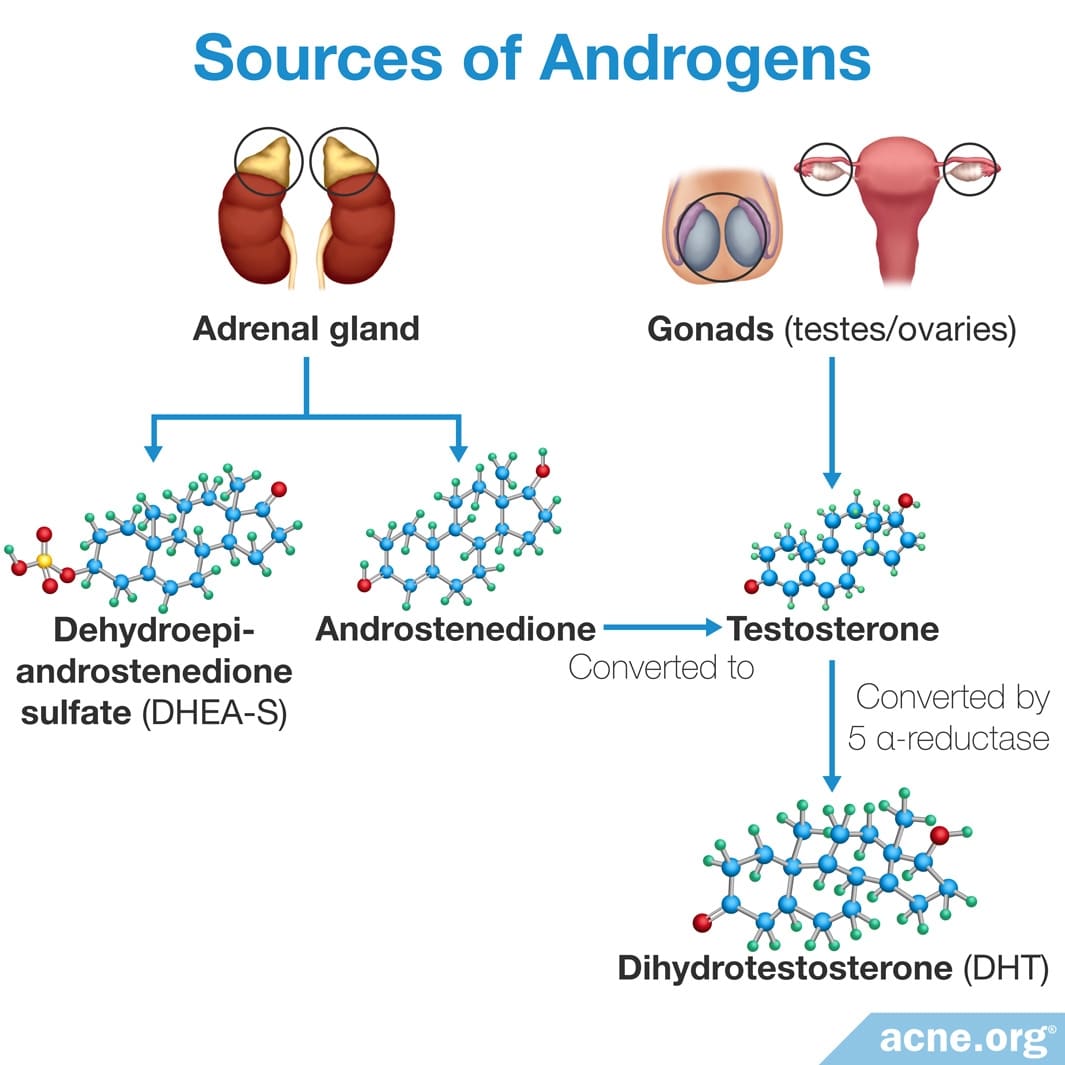When Is Birth Control Recommended For Acne Treatment
Birth control pills can be effective against all types of acne, including blackheads, whiteheads, and inflammatory acne. Your healthcare provider may recommend trying birth control for acne treatment when other options like topical acne creams and oral antibiotics have failed. Since birth control is relatively safe, it may be prescribed before other acne medications with harsher side effects like isotretinoin are recommended.
Recommended Reading: How To Naturally Balance Hormones During Menopause
How Testosterone Causes Hormonal Acne
Testosterone’s role in acne is simple. When your body starts to produce more testosterone than normal, it can trigger an increase in your skins production of sebum.
Sebum is a natural oil that your body secretes from the sebaceous glands. It flows onto your skins surface. . Think of it as your bodys natural source of hydration for your skin an oily, waxy substance thats responsible for keeping your skin moist, soft and healthy.
Normally, sebum production is a good thing. However, when your testosterone levels increase, your body can produce too much sebum. This sebum then clogs inside your hair follicles and causes either whiteheads or blackheads to develop.
For the most part, more testosterone equals more sebum production. Testosterone’s effect on sebum production is more obvious in people sensitive to the hormone, meaning some people will get more severe hormonal acne than others.
If your skin is sensitive to androgens, you may notice acne in the days leading up to and during your period. This is because your bodys production of androgens tends to peak during your period.
At the same time, your bodys production of progesterone a hormone that maintains optimal skin hydration and elasticity declines to its lowest level.
The end result is a major vulnerability period for your skin. With androgens at their peak and progesterone at its lowest, your skin is far more susceptible to acne than usual, resulting in a monthly outbreak that affects many women.
What Does Hormonal Acne Look Like
Whiteheads, blackheads, papules, pustules, cysts and nodules are all common hormonal acne symptoms. Normally, whiteheads and blackheads do not cause pain, inflammation or swelling, but if they do, then they are most likely forming into cysts and pustules. If you do not know what a cyst is, it forms underneath the skin. It is typically tender or sore to the touch. Inflamed acne can cause redness, swelling, soreness and pain.
While hormonal acne can appear anywhere on your body, typical places depend on your age and health. Teenagers tend to have these lesions on the T-zone . Adults who are 20 years or older have breakouts, usually at the lower parts of their face like the jawline, chin and bottom of the cheeks. However, hormonal acne can appear on the neck, back, shoulders and chest as well.
Read Also: Will Melatonin Help You Sleep
Why Are So Many Grown Up Women Suffering With Acne And Pimples
The answers started arriving to me in such clarity a few years ago. Actually 10 years ago when I had a hormone back down.
I wont go into the details now but it was a personal journey that has lead me to now specialise in hormones.
It was only during the recovery process that I started to realise my personal battle with pimples and acne was due to hormones and food!
Pimples are skin pores that can produce extra oil, trap in bacteria or are inflammed from within.
Sometimes pus builds up or bacteria or dirt can get trapped leading to a black head.
Signs You’re Dealing With Hormonal Acneand How To Treat It

Ah, hormonal acnethose pesky, painful, and unpleasant pimples that show up at the worst times imaginable . Werent you supposed to shake off acne in your teen years?
Sadly, notespecially if youre battling bouts of hormonal acne, which most commonly appears in adult women ages 20 to 40. And even the post-40 crowd is not in the clear, New York City-based dermatologist Cherise M. Levi, M.D., tells SELF. There can be a resurgence of breakouts around menopause due to hormonal fluctuations in the body.
How can you tell if youre dealing with hormonal acne versus run-of-the-mill acne? Dermatologists use a few key characteristics to pinpoint if a pimple is hormonal. Keep reading to learn how to spot hormonal breakouts, plus six expert-approved hormonal acne treatments.
You May Like: What Hormone Causes Chin Acne
What Questions Should I Ask My Healthcare Provider
- How severe is my acne?
- What lifestyle changes should I make to prevent hormonal acne from forming?
- What are the side effects to my acne treatment?
- Can I take this treatment if I become pregnant?
A note from Cleveland Clinic
It can be frustrating to see breakouts on your skin as an adult, considering they are most frequent among adolescents. Talk with your healthcare provider if your acne is persistent and they will be able to offer advanced treatment options to eliminate pesky pimples.
Last reviewed by a Cleveland Clinic medical professional on 09/10/2021.
References
A Simple Acne Face Map Break Down:
- Forehead: Caused by bacteria in small intestines or digestion issues, irregular sleep, stress
- Cheeks: gut health, digestion issues, unbalanced microbiome, bacteria from phone, bacteria from pillowcases
- Lower cheeks and along the jawline: Hormones! Or as many women are aware, the monthly cause of their acne- dreadful period
- Hair line: sweat and hair products
Read Also: What Type Of Doctor Do You See For Hormone Imbalance
Hormonal Acne: Diet Dos And Donts
The exact role between diet and hormonal acne isnt fully understood. Some foods may help prevent acne particularly inflammation-fighting foods.
Plant-based foods high in antioxidants may help reduce inflammation and promote clearer skin. Omega-3 fatty acids may also decrease skin inflammation.
Contrary to popular belief, junk food alone doesnt cause acne. But overdoing it on certain foods may lead to increased inflammation.
You may consider limiting the following:
- refined carbs, such as white bread and pasta
To clear up hormonal acne and keep it at bay its important to establish an appropriate skincare routine.
Does Testosterone Cause Acne In Women
Though testosterone is thought of as a male hormone, female ovaries produce it in small amounts. Women produce other androgens that can worsen acne as well.
Most women with acne still have normal levels of testosterone. However, if you have other signs of abnormally high testosterone, such as excess facial or body hair, deep voice, and irregular menstrual periods, you may want to talk about hormone testing with your doctor.
Also Check: What Are The Side Effects Of Estrogen
Low Dose Birth Control Pills
These tablets and devices are low in Estrogen and, therefore, tend to increase the bodies Androgen levels as the Estrogen drop. Think of a teeter-totteras one goes down the other goes up.
As a general rule of thumb, those with the potential for higher androgenic symptoms should be avoided for people prone to acne because they promote breakouts. As an acne sufferer, it is critical to speak with your doctor about selecting a form of birth control that is higher in estrogen and lower in androgen potency.
SOLUTION: Take out the IUD or come off the low-dose birth control pill and switch to a safe tablet if you are on birth control for a said reason. Here at Natural Acne Clinic, we are not proponents of using birth control pills or devices to balance hormone levels or to clear acne. With that said, it is ok to be on certain types of birth control to prevent pregnancy and keep your skin clear.
What Causes High Cortisol Or Altered Insulin Levels
Cortisol is our stress hormone. So when we feel under perceived harm, we release cortisol.
Insulin is a hormone released into our blood stream when we eat carbohydrates to help the sugar into the cell where it is used for energy.
Both increase our blood sugar levels.
Insulin need a key vitamin called inositol to activate receptor sites on the cell. Without this activation, serum testosterone levels can go up or serum insulin levels can go up. Both may result in pimples.
You May Like: Where Do You Get Your Hormones Tested
How Your Monthly Cycle Affects Your Skin
Its very common for women to experience acne especially the week before your period starts. This is because your oestrogen levels are dropping. These outbreaks will usually clear up after your period starts and your oestrogen levels increase.
Its still not completely clear why lower oestrogen levels cause this but it could be because:
- of the balance between your oestrogen and progesterone levels during this phase in your cycle
- you dont have enough oestrogen to stop your glands from producing too much oil so your pores become clogged
Dermatologists will normally advise hormonal testing for women who have acne along with other symptoms that could indicate PCOS like irregular periods and excessive body hair.
Insulin And Hormonal Acne

Insulin is produced by your pancreas and oversees blood sugar balance. When you eat carbohydrates, blood sugar rises, and insulin is released. This is a normal and healthy response. Insulin signals to move sugar out of the blood and inside the cells.
While we don’t want to fear carbohydrates in the diet, too much insulin is inflammatory and is associated with chronic diseases like type 2 diabetes, but it can also impact your skin by boosting androgen production and IGF-1.
IGF-1 is a hormone very similar to insulin that also increases the production of androgens. Research connects higher blood levels of IGF-1 to more severe acne, and it may also increase those inflammatory cytokines linked to breakouts.
In other words, a diet high in foods that spike your blood sugar will increase insulin. Insulin, in turn, stimulates IGF-1 and androgen production, which increases sebum production and inflammation, causing breakouts and worsening acne.
But remember, it doesn’t mean that eating sugar automatically causes acne for everyone. We all respond differently to food, but as you’ll see below, sugar is only one of the foods that could worsen acne.
The only way to know for sure if what you’re eating is causing acne is to follow an elimination diet. In an elimination diet, you remove all potentially problematic foods and see if your skin improves. For many women, diet makes a significant difference.
Don’t Miss: How To Reset Hormones That Control Female Metabolism
Do Hormonal Contraceptives Treat Or Cause Acne
In general, hormonal birth control pills are considered an effective treatment for acne in some women. In fact, using the pill to treat acne has been an accepted FDA-approved practice for many decades. Heres why it works.
As we mentioned, all women need androgens for their overall health , but when they have too much coursing through their veins, their skin gets too oily, their pores clog, and they develop acne.
But the estrogen and progesterone in oral contraceptives lowers your androgens, calms down the sebum production, and decreases your acne breakouts.
Read Also: Low Growth Hormone Symptoms In Adults
So What Are Androgens
Androgens are commonly thought of as the male sex hormone. Everyone has estrogen, progesterone, and androgens in their systems, but at different levels. These levels fluctuate throughout the month, especially for women in response to their menstrual cycles.
Androgens stimulate the production of sebum , which plays a significant role in the formation of acne. Men’s systems are used to androgens, as they are their main sex hormone. However, women’s systems are not, and during their cycle the level of androgens increases, causing oilier skin and more acne breakouts due to the fact that their systems can’t use it. Androgens find their way out of the body via acne.
This is part of why some women suffer from acne breakouts well into adulthood, usually around the time of their period.
Don’t Miss: Can My Doctor Prescribe Bioidentical Hormones
The Connection Between Testosterone And Acne
Testosterone belongs to a class of male sex hormones called androgens, which can trigger acne by over-stimulating oil glands. They can also change the skin cells that line hair follicles, making them sticky and more likely to clog pores.
Heres how it works: Tiny glands are inside the pores of your skin, and they produce an oil called sebum. Sebum carries dead skin cells from follicles to your skins surface, but when there is too much of it, follicles become clogged and pimples can emerge. Testosterone increases the production of sebum, making it a prime acne culprit.
How Pregnancy Hormones Affect Acne
From the size of her belly to the speed at which her heart beats, a womans body undergoes major changes during pregnancy1. Over nine months, her hormones fluctuate constantly. As hormones and acne are closely linked, how does pregnancy affect her skin? What about the pregnancy glow?
Because hormones have a different effect on everyone, its impossible to predetermine how pregnancy will impact a womans acne. Although every womans experience is different, below is an extremely simplified explanation of how pregnancy can affect a womans acne.
First Trimester
In the first trimester, a womans hormones become progesterone dominant. Progesterone is an androgen hormone that causes your skin to produce a larger amount of thick, waxy sebum . The skins sebum production is the stimulant that causes acne or skin breakouts. For this reason, most acne flare-ups happen in early pregnancy.
To make matters worse, morning sickness is also typically experienced in the first trimester. When a pregnant woman is too sick to eat, she may become vitamin deficient, which also plays a role in breakouts.
Second Trimester
Third Trimester
It isnt until the third trimester that women get the desirable pregnancy glow, which happens for a couple of reasons:
References
You May Like: Do Hormonal Iuds Cause Weight Gain
How Do You Know If Acne Is Hormonal
There are several signs that your pimples are related to hormones. According to dermatologists, here are a few signs of hormonal acne:
While wed love to leave acne behind once we enter our 20s, the reality is acne flare-ups are possible at any time. Hormonal acne is the type thats most likely to attack in your 20-something years, since those are the years when people with vaginas tend to be most hormonally active. Your 20s is often the peak childbearing age, says Dr. Jegasothy. This makes people with vaginas more prone to the intense hormonal fluctuations of pregnancy, childbirth, and breastfeeding.
But age alone wont determine whether or not youll break out. Genetics can dictate when hormonal breakouts start and stop. Throughout my professional career, Ive found that nearly half of women in their 20s experience acneand menopause can cause a resurgence of breakouts, Marina Peredo, M.D.6, cosmetic and medical board-certified dermatologist and associate clinical professor of dermatology at Mount Sinai Hospital, tells SELF.
This is because these excess hormones in your body stimulate the oil glandsmany of which are around your chin area, says Dr. Peredo. These excess oil glands make your skin a prime spot for these types of breakouts.
really
Trouble With A Capital T
The hormone that gets the ball rolling in acne is called testosterone. Although testosterone is an androgen and is the hormone that gives men their lower voices and increased facial hair, women need testosterone, too.
When your body produces a lot of testosterone during puberty, it sets up a cascade that can lead to acne lesions. One of the functions of testosterone is to produce sebum, an oily substance that protects and cleans your follicles .
The problem is, during puberty, both girls and boys produce so much testosterone that it ends up overstimulating the production of sebum. When your follicles are overflowing with sebum, it makes it harder for the dead skin cells inside the follicle to move to the surface and shed. Instead, the cells clump together with the sebum, forming comedones .
The clumps of oil and dead skin cells in comedones feed the bacteria that are normally present on your skin. Since theres now an abundance of food, the bacteria proliferate. All that bacteria feasting on dead skin and sebum in your follicles sets up an inflammation cascade that results in a pimple, or zit.
Also Check: How To Get Rid Of Estrogen Dominance
Cystic Acne And The Part Hormones Play
Cystic acne is a severe type of acne where pores in the skin become blocked, which can lead to inflammation and infection. The condition often affects the face, upper trunk, upper arms, and can extend to other areas of the body. “Cystic acne describes deep inflammatory pockets of acne below the surface of the skin. It tends to cause more painful acne lesions which can lead to more aggressive scarring. Hormones are a common trigger for cystic acne and can sometimes worsen things along the chin and jawline in particular,” says dermatologist Jennifer Adams, MD. “There are several different types of acne ranging from the milder comedonal bumps, to papulopustular, to the most inflammatory type called nodulocystic. The more aggressive forms of acne tend to cause more inflammation and affect deeper levels under the skin. Cystic acne tends to refer to those deeper seated zits.”
Menopause Brings Another Testosterone Surge

Even though your hormones diminish as you enter perimenopause and menopause, the balance could shift in favor of testosterone again. As your estrogen drops, the relative abundance of testosterone can trigger acne outbreaks.
Of course, drops in estrogen come with a slew of other symptoms, including insomnia, bone loss, and hair loss. You might benefit from hormone replacement therapy to control your symptoms. A nice side effect of HRT is less acne.
Recommended Reading: Is Hormone Positive Breast Cancer Hereditary